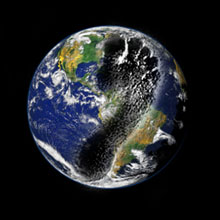
 For every bag at the curb on trash day, there's another 70 or so bags from the manufacturing process that made all that stuff, so when we focus on recycling, we're missing the point that its not the tail end of the snake that bites us.
For every bag at the curb on trash day, there's another 70 or so bags from the manufacturing process that made all that stuff, so when we focus on recycling, we're missing the point that its not the tail end of the snake that bites us.
A majority of us realize we need to take better care of the planet, but most of what we get encouraged to do to clean it up is insignificant. The best way to shop green isn't to buy greener products, it's to buy fewer ones.
When we decide to improve tomorrow rather than squandering it, there's only a few lifestyle changes that make all the difference.
Buy Fewer Nonessentials
Most of our retail purchases are completely unimportant to the goal of living sustainably, or indeed happily. We can't eat status symbols, and research proves it isn't our possessions that genuinely bring us joy. We need to live within our means, not only in terms of credit card debt but also in resource availability, and that requires taking a hard look at things.
Think Local
Support your local economy, frequent local craftspeople, eat local food, and get to know your neighbours. It won't only reduce the emissions we create with long distance shipping. It also grows more skills, resources, and opportunities close to you, improving the available quality of life where you live.
Eat Lower On The Food Chain
In 1965, there were 3.3 billion humans on the planet and they ate 10 billion livestock. In 2011 the 7 billionth human being will be born, but we now slaughter more than 56 billion livestock animals, so that's the real population bomb. Livestock grazing already uses one quarter of the ice free terrestrial surface of the planet, and India and China now want to eat meat like we do. Not to mention that lower impact diets also mean significant health gains.
Go Low Tech
High tech solutions use complex and rare materials, commonly have unexpected side effects, and are expensive. High tech gets replaced, while low tech can be repaired, with fewer parts to go wrong. Security and confidence comes from knowing that in a pinch you might be able to fix something yourself.
Don't Fly
For the average North American, one year of driving creates 2.2 tons of emissions, and one year of eating represents 3 tons. One return airfare from Toronto to Rome can be 5.5 tons, the largest spike in emissions many of us aspire to. Road trips are greener, and the train better still. Spend those dollars greening your home, which is where you'll spend most of your time, and it will pay you back.
Give Up Your Car
Telecommute, use public transit, walk, bicycle. Bicycles are the most efficient transportation weve ever invented, and we could clearly use the exercise. Many cities now have car share programs you can join, so that if you have to move something heavy across town you can get wheels for the day without the ongoing expense, maintenance, temptation, and danger that car represents in your driveway.
We'd need six planets to provide the world a North American lifestyle, and there is perpetual pressure to keep the economy growing indefinitely, but ecology is the true wealth of our planet. Today’s children have a shorter life expectancy than their parents for the first time in many centuries.
I've not only slashed my budget and my carbon footprint, I'm healthier, more relaxed, and having more fun in doing it. The shift to sustainability is inevitable. We will either do it voluntarily, which is difficult and inconvenient, or collapsing resources and environmental degradation are going to do it for us. When you make sustainable choices, be proud.
Tell your friends. If we genuinely want to make tomorrow a better place, that's how we are going to do it.